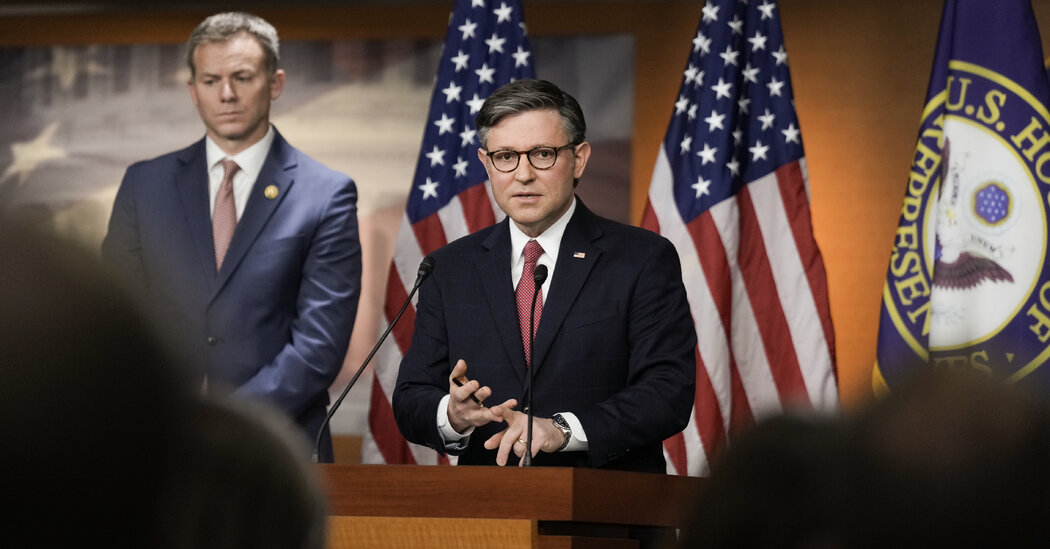The House on Thursday passed its latest short-term stopgap spending patch to head off a partial government shutdown at the end of the week, moving over the objections of right-wing Republicans to give Congress more time to resolve funding disputes that have persisted for months.
The measure, initially floated by Speaker Mike Johnson, would extend funding for half of the government for one week, through March 8, and the rest for three weeks, until March 22. The Senate was expected to pass it as early as Thursday evening, clearing it for President Biden and averting a lapse in federal funding for several agencies that otherwise would begin at 12:01 a.m. on Saturday.
It passed by a vote of 320 to 99, with Democrats providing the bulk of the votes and Republicans roughly split. Ninety-seven Republicans and two Democrats opposed the measure.
Congressional leaders cleared the way for the legislation on Wednesday when they said they had come to an agreement on six of the 12 annual spending bills, and planned to finalize the details, debate the package and clear it to be signed into law by March 8. If they fail to do so, they will face another partial shutdown next week.
And even if they do, lawmakers will still have to agree on the other six spending measures, and then try to pass them individually over the next three weeks, or face yet another potential shutdown.
For months, Congress has been mired in seemingly intractable spending negotiations, as Republicans bent on steep cuts and conservative policy mandates refused to accept a deal with Democrats. The vote on Thursday marked the fourth time since September that lawmakers had essentially punted on the fight and passed a stopgap spending bill keeping government funding flowing at current levels.
It was also the latest instance in which Mr. Johnson, who had vowed never to pass another temporary spending bill, was forced to turn to Democrats to win approval of crucial legislation, steering around the opposition of right-wing Republicans who have refused to allow such measures to get a vote.
Mr. Johnson said on Thursday before the vote that with his razor-thin majority, and with Democratic control of the Senate and White House, House Republicans were “trying to turn the aircraft carrier back to real budgeting and spending reform.” He noted that lawmakers had tried to negotiate the spending bills individually, rather than wrapping them into a single, sprawling package for an up-or-down vote — though the legislation envisioned for a vote next week would tie six funding measures into a single bill.
“We broke the omnibus fever. That’s how Washington has been run for years,” Mr. Johnson said. “This was an important thing to break it up into smaller pieces.”
Echoing comments he had made privately to his conference, Mr. Johnson said he was “excited” and “anxious” to “turn the page” on this year’s negotiations to fund the government, and to instead start negotiations to fund the government for the next fiscal year, which begins in October.
The text of the package of six spending bills congressional leaders agreed on this week was expected to emerge over the weekend. Among the conservative victories House Republicans highlighted on Thursday in a closed-door meeting were a measure that would block a move by the Department of Education that could have expanded Pell Grant eligibility for more than quarter of a million students. House Republicans estimated the new FAFSA guidance would have increased the cost of the program by $3 billion annually.
They also secured a measure to bar the Department of Veterans Affairs from flagging veterans deemed mentally incompetent to the F.B.I.’s gun background check database without a court order.
As negotiations slogged on, Mr. Johnson had become increasingly candid behind closed doors about the limits of his leverage at the negotiating table.
Republicans have been divided over what to push for in spending talks. Ultraconservative lawmakers who rarely support spending legislation have been the loudest voices in favor of cuts and hard-line policy provisions, but more mainstream and politically endangered Republicans have refused to back them. And hard-right lawmakers have routinely blocked consideration of spending legislation, requiring Democratic votes to move the bills out of the House.
“This is the House Republicans coming to terms with reality,” Representative Patrick T. McHenry of North Carolina, said of his colleagues.
“He is making the inevitable decision that was clear in September,” Mr. McHenry said of the speaker. “It was clear in November, December — it’s been clear for months that this is the outcome.”
Hard-line conservatives who have lobbied for steep spending cuts and a bevy of conservative policy dictates — and revolted after former Speaker Kevin McCarthy passed a stopgap spending bill using a bipartisan coalition — evinced resigned disappointment on Thursday.
“Just more of the same,” Representative Chip Roy of Texas, an influential conservative, said of the deal. “We’re not going to do anything that’s going to actually change the border.”
He added: “It’s just the swamp doing what the swamp does.”


